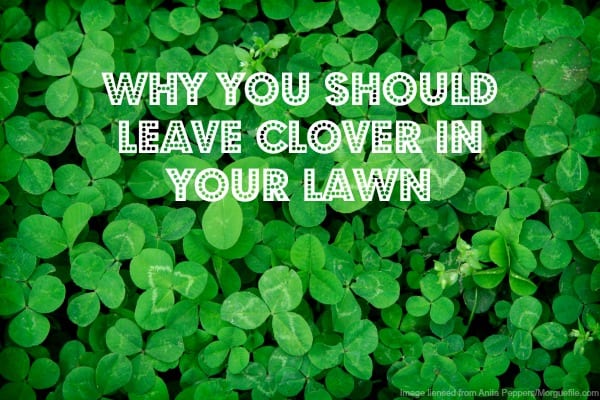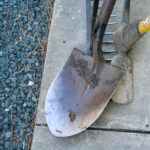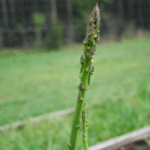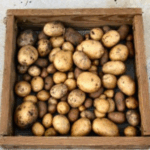Leave clover in your lawn, organic gardeners! There are many reasons why you should leave clover in your lawn. Clover isn’t the enemy. It’s a gardener’s friend.
Why You Should Leave Clover in the Lawn
There are many good reasons why you should leave clover in the lawn. Clover in the lawn isn’t a weed. It’s a natural, gorgeous, nitrogen-producing factory that feeds your soil and the local bees.
Once upon a time, people didn’t have lawns. Does that surprise you? The great estates had grassy yards kept cropped close by herds of sheep. Lawns came into vogue in the 1800s…after the lawn mower was invented. Before the lawn mower, your servants used great big scythes, or knives, to cut down the grass, or that handy band of sheep kept the grass cropped. Homes that had yards kept the grass trimmed in the same way, just on a smaller scale.
Then came the lawn mower, and it became fashionable to have a green, outdoor carpet underfoot for your outdoor activities. Those Victorian ancestors of ours loved “taming” nature, and lawns were just another effort to tame the outdoors.
Until recent times, most lawns consisted of various grasses such as fescue, rye, and yes, clover. While not technically a grass, clover has the unique ability to “fix” nitrogen, or take it out of the atmosphere through transpiration (plant breathing) and change it into usable soil nitrogen. You’ll find clover growing abundantly in lawns deficient in nitrogen; it’s busy adding what nature lacks.
[Tweet “Clover is beneficial to honeybees. These and 6 more reasons to leave clover in your lawn.”]
There are many good reasons why you should leave clover in the lawn:
- The more clover you have, the more natural nitrogen is being added to the soil. This means you have to add less fertilizer.
- It’s drought-resistant. Clover stays green even during hot, dry weather.
- The flowers nurture and sustain local bee populations. Blooming clover attracts honeybees, and the pollen from clover is very beneficial to bee colonies.
- Clover flowers are beautiful!
- White clover crowds out other weeds. Where you have a healthy clover population, you will have fewer broadleaf weeds.
- Clover feeds wildlife such as rabbits, keeping them out of your garden and happily munching clover on the lawn.
- As an organic gardener, keeping clover alive not only keeps the bees alive, but decreases both the amount of herbicide applied to lawn areas and the amount of artificial nitrogen applied to lawn areas….both very, very appealing prospects for the organic gardener!
Four Leaf Clovers?
White clover was considered a good luck plant from early times. The Celts believed it warded off evil spirits. A four-leaf clover, found naturally among white clover plants, is considered especially good luck.
The leaves of a typical clover plant represent faith, hope and love. A four leaf clover adds luck as its fourth lucky leaf!
Although rare, they aren’t uncommon, and most people have indeed found a four leaf clover at least once in their lives.
Now you see, if you leave that clover growing in your lawn, you’ll have a better chance at finding a lucky four leaf clover. Isn’t that yet another GREAT reason to leave clover alone in your lawn?






My backyard beekeeper friends say that honey made from clover is not that good – there are other pollen sources they would rather their bees munch on. Still, it feeds them.
Thanks for the insights, Ray. Feeding the bees is really important, especially in early spring!
This is interesting bits of history and lesson. I appreciate the fact that you shared it with us. I don’t know hardly anything about things kinds of things. You managed to make this interesting which is impressive.
Clover in my yard harbours millions of aphids! And now the aphids are attacking my vegetables :'(
Aphids aren’t limited to clover, and I’m thinking they might be something else. I’m having a terrible problem with aphids on green beans this year too. Lady bugs, or lady beetles, are a time-honored method of controlling aphids. Might want to give it a try.
I have 3 acres of mowable lawn. My kids get stung constantly any time they try to go outside because we have literally THOUSANDS of bees all day long on our lawn.
I think the clover is pretty and it smells nice, but these darn bees! So what they’re good for the environment. That’s wonderful! But I still want to let my kids run about outside without fear of getting stung EVERY LITERAL 3 FEET!
I do understand where you are coming from but without those bees our food chain collapses.
Go ahead and get rid of the clover. Other people will still have plenty. I love bees, but only 3 or 4 at a time. It sounds as if you have a zoo.